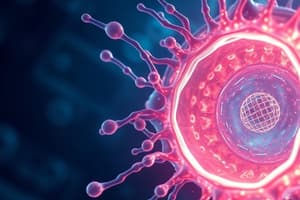Podcast
Questions and Answers
What is the primary function of the cell membrane?
What is the primary function of the cell membrane?
- Regulation of nutrient transport (correct)
- Synthesis of DNA
- Generation of proteins
- Production of energy
Which organelle is responsible for cellular respiration?
Which organelle is responsible for cellular respiration?
- Endoplasmic reticulum
- Golgi apparatus
- Mitochondria (correct)
- Lysosome
What is the function of ribosomes in a cell?
What is the function of ribosomes in a cell?
- Lipid synthesis
- Protein synthesis (correct)
- Energy production
- Cell detoxification
Which cellular component houses the genetic material of a cell?
Which cellular component houses the genetic material of a cell?
What is the role of enzymes in cellular processes?
What is the role of enzymes in cellular processes?
Which cellular structure is essential for maintaining the structural integrity of a cell?
Which cellular structure is essential for maintaining the structural integrity of a cell?
What is the final stage of cellular respiration that generates ATP?
What is the final stage of cellular respiration that generates ATP?
Which organelle is responsible for breaking down and recycling cellular waste and foreign materials?
Which organelle is responsible for breaking down and recycling cellular waste and foreign materials?
What is the primary energy currency of the cell?
What is the primary energy currency of the cell?
Which cell organelle is involved in protein synthesis by translating mRNA into specific proteins?
Which cell organelle is involved in protein synthesis by translating mRNA into specific proteins?
Which biological molecules catalyze specific biochemical reactions in the cell by lowering the activation energy?
Which biological molecules catalyze specific biochemical reactions in the cell by lowering the activation energy?
What network of tubules participates in protein synthesis, folding, and lipid synthesis within a cell?
What network of tubules participates in protein synthesis, folding, and lipid synthesis within a cell?
Flashcards are hidden until you start studying
Study Notes
Cell Biology
Cell biology is the study of cells, their structure, function, and interactions. It is a multidisciplinary field that encompasses various aspects of cellular physiology, including cell membrane structure and function, cellular respiration, cell organelles, and enzymes.
Cell Membrane
The cell membrane, also known as the plasma membrane, is a lipid bilayer that surrounds the cell and separates the intracellular environment from the extracellular environment. It is a selectively permeable barrier that regulates the movement of molecules in and out of the cell. The cell membrane is composed of various types of lipids and proteins, including phospholipids, cholesterol, and transmembrane proteins, which play crucial roles in cellular processes such as signaling, cell recognition, and nutrient transport.
Cell Structure
The structure of a cell is divided into three main parts: the nucleus, cytoplasm, and cell membrane. The nucleus houses the cell's genetic material (DNA) and is surrounded by the nuclear membrane. The cytoplasm is the space between the cell membrane and the nuclear membrane, and it contains various organelles, such as mitochondria, ribosomes, and endoplasmic reticulum, that perform various functions in the cell. The cell membrane surrounds the entire cell and maintains its structural integrity.
Cellular Respiration
Cellular respiration is the process by which cells produce energy through the breakdown of organic molecules, such as glucose, in the presence of oxygen. This process occurs in three stages: glycolysis, the citric acid cycle (also known as the Krebs cycle or TCA cycle), and the electron transport chain. In the presence of oxygen, the final stage of cellular respiration, oxidative phosphorylation, generates ATP (adenosine triphosphate), the primary energy currency of the cell.
Cell Organelles
Cell organelles are specialized subunits within a cell that perform specific functions. Some of the main cell organelles include:
- Nucleus: Houses the cell's genetic material (DNA) and plays a central role in cellular metabolism and regulation.
- Mitochondria: Produce ATP through cellular respiration and are essential for energy production.
- Endoplasmic reticulum (ER): A network of tubules that participate in protein synthesis, folding, and lipid synthesis.
- Golgi apparatus: Modifies, sorts, and packages proteins and lipids for transport to their final destinations within the cell or for secretion.
- Lysosomes: Contain digestive enzymes to break down and recycle cellular waste and foreign materials.
- Ribosomes: Site of protein synthesis, where the genetic information encoded in mRNA (messenger RNA) is translated into specific proteins.
Enzymes
Enzymes are biological molecules that catalyze specific biochemical reactions in the cell. They are essential for maintaining cellular metabolism and are responsible for nearly all chemical reactions in the body. Enzymes consist of proteins or RNA (ribozymes) and act by lowering the activation energy of a reaction, which allows it to proceed more quickly and efficiently.
In summary, cell biology is a fascinating and complex field that studies the structure and function of cells. By understanding the various components and processes that occur within cells, we can gain insights into the fundamental processes of life and the mechanisms of disease.
Studying That Suits You
Use AI to generate personalized quizzes and flashcards to suit your learning preferences.




